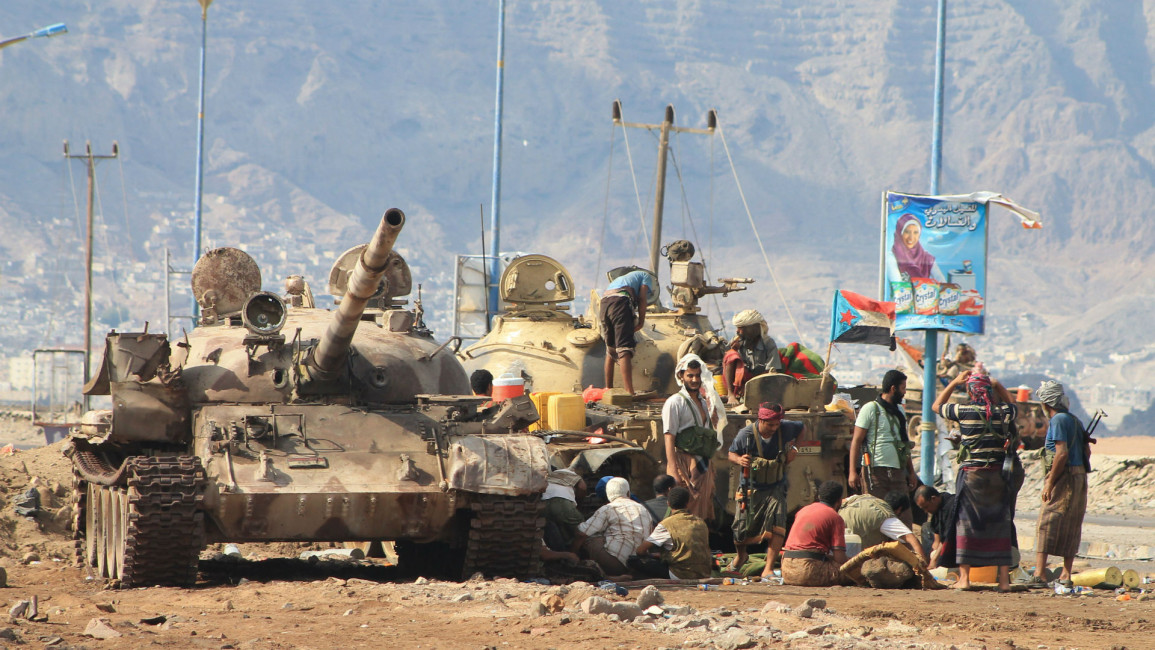Besieged Aden sees worst fighting yet
Besieged Aden sees worst fighting yet
Coalition air strikes and artillery fire rocked the Yemeni port city of Aden overnight as combatants battled for control of the airport in the worst fighting yet.
2 min read
Fighters in Aden have raised the flag of the former South Yemen (AFP).
The Saudi-led coalition pressed on with air strikes Thursday against rebels in south Yemen where fierce clashes raged between the insurgents and southern fighters, sources said.
Warplanes hit Houthi positions, allied to forces loyal to former president Ali Abdullah Saleh, in the main southern city of Aden helping local forces to retake positions, sources among the southern fighters said.
Houthi-Saleh forces and local militiamen also exchanged tank and mortar fires in the Khormaksar district around the airport perimeter throughout the night.
Residents said dozens of families fled, braving Houthi sniper fire and checkpoints as homes were shelled and burned.
"The scene is disastrous, not just in the streets where fighting is going on but inside houses where families are often trapped and terrified," local activist Ahmed al-Awgari said.
"Women and children have been burnt in their homes, civilians have been shot in the streets or blown up by tank fire," he added.
Hundreds of civilians and fighters from both sides have been killed throughout the conflict, and residents said at least six Houthis and two local militiamen were killed overnight.
The Houthis are from Yemen's far north and predominantly belong to the Zaydi sect of Shia Islam. They swept into the capital Sanaa in September and, in alliance with Saleh's forces, pushed south and east, saying they were winning a revolution against militants and corrupt officials.
But their push into Aden's outskirts on March 25 triggered a Saudi-led air campaign to drive them back and aid local gunmen.
The kingdom believes the group is a proxy for Iran, and Saudi backing for the resistance in Yemen's mostly Sunni south has raised fears that Yemen could descend into all-out sectarian war.
Yemen's vice president in exile, Khaled Bahah, said that the breakdown of Yemen's military during the conflict was helping al-Qaeda in the Arabian Peninsula (AQAP), the boldest branch of the global militant group, and said the Houthis were not confronting them.
"All we're seeing is them making war on the Yemeni people, not al Qaeda," Bahah told Qatar-based al-Jazeera TV. "Al Qaeda has advanced and taken some positions in Yemen because of the security and military vacuum," he added.
Warplanes hit Houthi positions, allied to forces loyal to former president Ali Abdullah Saleh, in the main southern city of Aden helping local forces to retake positions, sources among the southern fighters said.
Houthi-Saleh forces and local militiamen also exchanged tank and mortar fires in the Khormaksar district around the airport perimeter throughout the night.
Residents said dozens of families fled, braving Houthi sniper fire and checkpoints as homes were shelled and burned.
"The scene is disastrous, not just in the streets where fighting is going on but inside houses where families are often trapped and terrified," local activist Ahmed al-Awgari said.
"Women and children have been burnt in their homes, civilians have been shot in the streets or blown up by tank fire," he added.
Hundreds of civilians and fighters from both sides have been killed throughout the conflict, and residents said at least six Houthis and two local militiamen were killed overnight.
The Houthis are from Yemen's far north and predominantly belong to the Zaydi sect of Shia Islam. They swept into the capital Sanaa in September and, in alliance with Saleh's forces, pushed south and east, saying they were winning a revolution against militants and corrupt officials.
But their push into Aden's outskirts on March 25 triggered a Saudi-led air campaign to drive them back and aid local gunmen.
The kingdom believes the group is a proxy for Iran, and Saudi backing for the resistance in Yemen's mostly Sunni south has raised fears that Yemen could descend into all-out sectarian war.
Yemen's vice president in exile, Khaled Bahah, said that the breakdown of Yemen's military during the conflict was helping al-Qaeda in the Arabian Peninsula (AQAP), the boldest branch of the global militant group, and said the Houthis were not confronting them.
"All we're seeing is them making war on the Yemeni people, not al Qaeda," Bahah told Qatar-based al-Jazeera TV. "Al Qaeda has advanced and taken some positions in Yemen because of the security and military vacuum," he added.



